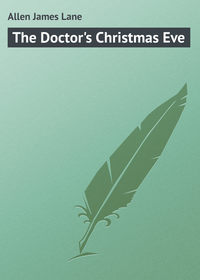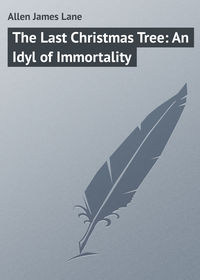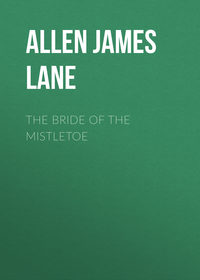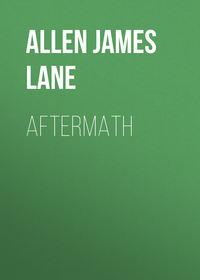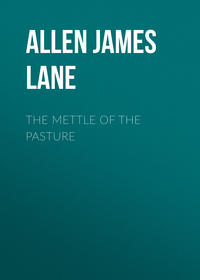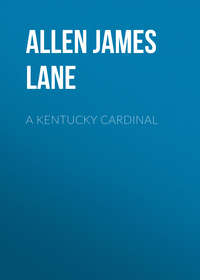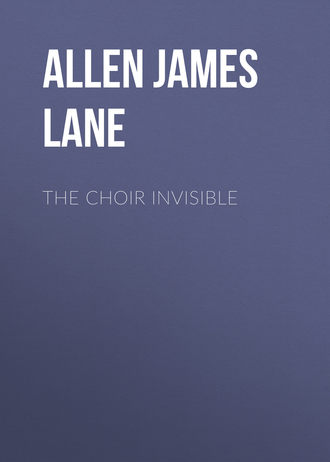 полная версия
полная версияThe Choir Invisible
Except four persons: Amy did not come; nor Joseph, with whom he had quarrelled and with whom he meant to settle his difference as soon as he could get about; nor O'Bannon, whose practical joke had indirectly led to the whole trouble; nor Peter, who toiled on at his forge with his wounded vanity.
Betrothals were not kept secret in those days and engagements were short. But as he was sick and suffering, some of those who visited him forbore to mention her name, much less to speak of the preparations now going forward for her marriage with Joseph. Others, indeed, did begin to talk of her and to pry; but he changed the subject quickly.
And so he lay there with the old battle going on in his thoughts, never knowing that she had promised to become the wife of another: fighting it all over in his foolish, iron-minded way: some days hardening and saying he would never look her in the face again; other days softening and resolving to seek her out as soon as he grew well enough and learn whether the fault of all this quarrel lay with him or wherein lay the truth: yet in all his moods sore beset with doubts of her sincerity and at all times passing sore over his defeat—defeat that always went so hard with him.
Meantime one person was pondering his case with a solicitude that he wist not of: the Reverend James Moore, the flute-playing Episcopal parson of the town, within whose flock this marriage was to take place and who may have regarded Amy as one of his most frisky wayward fleeces. Perhaps indeed as not wearing a white spiritual fleece at all but as dyed a sort of merino-brown in the matter of righteousness.
He had long been fond of John—they both being pure-minded men, religious, bookish, and bachelors; but their friendship caused one to think of the pine and the palm: for the parson, with his cold bleak face, palish straight hair put back behind white ears, and frozen smile, appeared always to be inhabiting the arctic regions of life while John, though rooted in a tropical soil of many passions, strove always to bear himself in character like a palm, up-right, clean-cut; having no low or drooping branches; and putting forth all the foliage and blossoms of the mind at the very summit of his powers. The parson and the school-master had often walked out to the Falconers' together in the days when John imagined his suit to be faring prosperously; and from Amy's conduct, and his too slight knowledge of the sex, this arctic explorer had long since adjusted his frosted faculties to the notion that she expected to become John's wife. He was sorry; it sent an extra chill through the icebergs of his imagination; but perhaps he gathered comforting warmth from the hope that some of John's whiteness would fall upon her and that thus from being a blackish lambkin she would at least eventually turn into a light-gray ewe.
When the tidings reached his far-inward ear that she was to marry Joseph instead of his friend, a general thaw set in over the entire landscape of his nature: it was like spring along the southern fringes of Greenland.
The error must not be inculcated here that the parson had no passions: he had three-ruling ones: a passion for music, a passion for metaphysics, and a passion for satirizing the other sex.
Dropping in one afternoon and glancing with delicate indirection at John's short shelf of books, he inquired whether he had finished with his Paley. John said he had and the parson took it down to bear away with him. Laying it across his stony knees as he sat down and piling his white hands on it, "Do you believe Paley?" he asked, turning upon John a pair of the most beautiful eyes, which looked a little like moss agates.
"I believe St. Paul," replied John, turning his own eyes fondly on his open Testament.
"Do you believe Paley?" insisted the parson, who would always have his questions answered directly.
"There's a good deal of Paley: what do you mean?" said John, laughing evasively.
"I mean his ground idea-the corner stone of his doctrine -his pou sto. I mean do you believe that we can infer the existence and character of God from any evidences of design that we see in the universe "
"I'm not so sure about that," said John. "What we call the evidences of design in the universe may be merely certain laws of our own minds, certain inward necessities we are under to think of everything as having an order and a plan and a cause. And these inner necessities may themselves rest on nothing, may be wrong, may be deceiving us."
"Oh, I don't mean that!" said the parson. "We've got to believe our own minds. We've got to do that even to disbelieve them. If the mind says of itself it is a liar, how does it know this to be true if it is a liar itself? No; we have to believe our own minds whether they are right or wrong. But what I mean is: can we, according to Paley, infer the existence and character of God from anything we see?" "It sounds reasonable," said John. "Does it! Then suppose you apply this method of reasoning to a woman: can you infer her existence from anything you see? Can you trace the evidences of design there? Can you derive the slightest notion of her character from her works?" As the parson said this, he turned upon the sick man a look of such logical triumph that John, who for days had been wearily trying to infer Amy's character from what she had done, was seized with a fit of laughter—the parson himself remaining perfectly grave.
Another day he examined John's wound tenderly, and then sat down by him with his beautiful moss-agate eyes emitting dangerous little sparkles.
"It's a bad bite," he said, "the bite of a cat—felis concolor. They are a bad family—these cats—the scratchers." He was holding John's wounded hand. "So you've had your fight with a felis. A single encounter ought to be enough! If some one hadn't happened to step in and save you!—What do you suppose is the root of the idea universal in the consciousness of our race that if a man had not been a man he'd have been a lion; and that if a woman hadn't been a woman she'd have been a tigress? "
"I don't believe there's any such idea universal in the consciousness of the race," replied John, laughing.
"It's universal in my consciousness," said the parson doggedly, "and my consciousness is as valid as any other man's. But I'll ask you an easier question: who of all men, do you suppose, knew most about women?"
"Women or Woman?" inquired John.
"Women," said the parson. "We'll drop the subject of Woman: she's beyond us!
"I don't know," observed John. "St. Paul knew a good deal, and said some necessary things."
"St. Paul!" exclaimed the parson condescendingly. "He knew a few noble Jewesses—superficially—with a scattering acquaintance among the pagan sisters around the shores of the Mediterranean. As for what he wrote on that subject—it may have been inspired by Heaven: it never could have been inspired by the sex." "Shakspeare, I suppose," said John. "The man in the Arabian Nights," cried the parson, who may have been put in mind of this character by his own attempts to furnish daily entertainment. "He knew a thousand of them—intimately. And cut off the heads of nine hundred and ninety-nine! The only reason he did not cut off the head of the other was that he had learned enough: he could not endure to know any more. All the evidence had come in: the case was closed."
"I suppose there are men in the world," he continued, "who would find it hard to stand a single disappointment about a woman. But think of a thousand disappointments! A thousand attempts to find a good wife—just one woman who could furnish a man a little rational companionship at night. Bluebeard also must have been a well-informed person. And Henry the Eighth—there was a man who had evidently picked up considerable knowledge and who made considerable use of it. But to go back a moment to the idea of the felis family. Suppose we do this: we'll begin to enumerate the qualities of the common house cat. I'll think of the cat; you think of some woman; and we'll see what we come to."
"I'll not do it," said John. "She's too noble."
"Just for fun!"
"There's no fun in comparing a woman to a cat."
"There is if she doesn't know it. Come, begin!" And the parson laid one long forefinger on one long little finger and waited for the first specification. "Fineness," said John, thinking of a certain woman.
"Fondness for a nap," said the parson, thinking of a certain cat.
"Grace," said John.
"Inability to express thanks," said the parson.
"A beautiful form," said John."A desire to be stroked," said the parson.
"Sympathy," said John.
"Oh, no!" said the parson; "no cat has any sympathy. A dog has: a man is more of a dog."
"Noble-mindedness," said John.
"That will not do either," said the parson. "Cats are not noble-minded; it's preposterous!"
"Perfect case of manner," said John.
"Perfect indifference of manner," said the parson."
"No vanity," said John.
"No sense of humour," said the parson.
"Plenty of wit," said John.
"You keep on thinking too much about some woman," remonstrated the parson, slightly exasperated.
"Fastidiousness," said John.
"Soft hands and beautiful nails," said the parson, nodding encouragingly.
"A gentle footstep," said John with a softened look coming into his eyes. "A quiet presence."
"Beautiful taste in music," said John.
"Oh! dreadful!" said the parson. "What on earth are you thinking about?"
"The love of rugs and cushions," said John, groping desperately.
"The love of a lap," said the parson fluently.
"The love of playing with its victim," said John, thinking of another woman.
"Capital!" cried the parson. "That's the truest thing we've said. We'll not spoil it by another word;" but he searched John's face covertly to see whether this talk had beguiled him.
All this satire meant nothing sour, or bitter, or ignoble with the parson. It was merely the low, far-off play of the northern lights of his mind, irradiating the long polar night of his bachelorhood. But even on the polar night the sun rises—a little way; and the time came when he married—as one might expect to find the flame of a volcano hidden away in a mountain of Iceland spar.
Toward the end of his illness, John lay one night inside his door, looking soberly, sorrowfully out into the moonlight. A chair sat outside, and the parson walked quietly up the green hill and took it. Then he laid his hat on the grass; and passed his delicate hands slowly backward over his long fine straight hair, on which the moonbeams at once fell with a luster as upon still water or the finest satin.
They talked awhile of the best things in life, as they commonly did. At length the parson said in his unworldly way:
"I have one thing against Aristotle: he said the effect of the flute was bad and exciting. He was no true Greek. John, have you ever thought how much of life can be expressed in terms of music? To me every civilization has given out its distinct musical quality; the ages have their peculiar tones; each century its key, its scale. For generations in Greece you can hear nothing but the pipes; during other generations nothing but the lyre. Think of the long, long time among the Romans when your ear is reached by the trumpet alone.
"Then again whole events in history come down to me with the effect of an orchestra, playing in the distance; single lives sometimes like a great solo. As for the people I know or have known, some have to me the sound of brass, some the sound of wood, some the sound of strings. Only—so few, so very, very few yield the perfect music of their kind. The brass is a little too loud; the wood a little too muffled; the strings—some of the strings are invariably broken. I know a big man who is nothing but a big drum; and I know another whose whole existence has been a jig on a fiddle; and I know a shrill little fellow who is a fife; and I know a brassy girl who is a pair of cymbals; and once—once," repeated the parson whimsically, "I knew an old maid who was a real living spinet. I even know another old maid now who is nothing but an old music book—long ago sung through, learned by heart, and laid aside: in a faded, wrinkled binding—yellowed paper stained by tears—and haunted by an odour of rose-petals, crushed between the leaves of memory: a genuine very thin and stiff collection of the rarest original songs—not songs without words, but songs without sounds—the ballads of an undiscovered heart, the hymns of an unanswered spirit."
After a pause during which neither of the men spoke, the parson went on:
"All Ireland—it is a harp! We know what Scotland is. John," he exclaimed, suddenly turning toward the dark figure lying just inside the shadow, "you are a discord of the bagpipe and the harp: there's the trouble with you. Sometimes I can hear the harp alone in you, and then I like you; but when the bagpipe begins, you are worse than a big bumblebee with a bad cold."
"I know it," said John sorrowfully. "My only hope is that the harp will outlast the bee."
"At least that was a chord finely struck," said the parson warmly. After another silence he went on.
"Martin Luther—he was a cathedral organ. And so it goes. And so the whole past sounds to me: it is the music of the world: it is the vast choir of the ever-living dead." He gazed dreamily up at the heavens: "Plato! he is the music of the stars."
After a little while, bending over and looking at the earth and speaking in a tone of unconscious humility, he added:
"The most that we can do is to begin a strain that will swell the general volume and last on after we have perished. As for me, when I am gone, I should like the memory of my life to give out the sound of a flute."
He slipped his hand softly into the breastpocket of his coat and more softly drew something out.
"Would you like a little music?" he asked shyly, his cold beautiful face all at once taking on an expression of angelic sweetness.
John quickly reached out and caught his hand in a long, crushing grip: he knew this was the last proof the parson could ever have given him that he loved him. And then as he lay back on his pillow, he turned his face back into the dark cabin.
Out upon the stillness of the night floated the parson's passion— silver-clear, but in an undertone of such peace, of such immortal gentleness. It was as though the very beams of the far-off serenest moon, falling upon his flute and dropping down into its interior through its little round openings, were by his touch shorn of all their lustre, their softness, their celestial energy, and made to reissue as music. It was as though his flute had been stuffed with frozen Alpine blossoms and these had been melted away by the passionate breath of his soul into the coldest invisible flowers of sound. At last, as though all these blossoms in his flute had been used up—blown out upon the warm, moon-lit air as the snow-white fragrances of the ear—the parson buried his face softly upon his elbow which rested on the back of his chair. And neither man spoke again.
XIII
WHEN Mrs. Falconer had drawn near John's hut on the morning of his misfortune, it was past noon despite all her anxious, sorrowful haste to reach him. His wounds had been dressed. The crowd of people that had gathered about his cabin were gone back to their occupations or their homes—except a group that sat on the roots of a green tree several yards from his door. Some of these were old wilderness folk living near by who had offered to nurse him and otherwise to care for his comforts and needs. The affair furnished them that renewed interest in themselves which is so liable to revisit us when we have escaped a fellow-creature's suffering but can relate good things about ourselves in like risks and dangers; and they were drawing out their reminiscences now with unconscious gratitude for so excellent an opportunity befalling them in these peaceful unadventurous days. Several of John's boys lay in the grass and hung upon these narratives. Now and then they cast awe-stricken glances at his door which had been pushed to, that he might be quiet; or, if his pain would let him, drop into a little sleep. They made it their especial care, when any new-comer hurried past, to arrest him with the command that he must not go in; and they would thus have stopped Mrs. Falconer but she put them gently aside without heed or hearing.
When she softly pushed the door open, John was not asleep. He lay in a corner on his low hard bed of skins against the wall of logs— his eyes wide open, the hard white glare of the small shutter-less window falling on his face. He turned to her the look of a dumb animal that can say nothing of why it has been wounded or of how it is suffering; stretched out his hand gratefully; and drew her toward him. She sat down on the edge of the bed, folded her quivering fingers across his temples, smoothed back his heavy, coarse, curling hair, and bending low over his eyes, rained down into them the whole unuttered, tearless passion of her distress, her sympathy. Major Falconer came for her within the hour and she left with him almost as soon as he arrived. When she was gone, John lay thinking of her.
"What a nurse she is!" he said, remembering how she had concerned herself solely his about life, his safety, his wounds. Once she had turned quickly:
"Now you can't go away!" she had said with a smile that touched him deeply.
"I wish you didn't have to go!" he had replied mourningfully, feeling his sudden dependence on her.
This was the first time she had ever been in room—with its poverty, its bareness. She must have cast about it a look of delicate inquiry—as a woman is apt to do in a singleman's abode; for when she came again, in addition to pieces of soft old linen for bandages brought fresh cool fragrant sheets—the work of her own looms; a better pillow with a pillow-case on it that was delicious to his cheek; for he had his weakness about clean, white linen. She put a curtain over the pitiless window. He saw a wild rose in a glass beside his Testament. He discovered moccasin slippers beside his bed.
"And here," she had said just before leaving, with her hand on a pile of things and with an embarrassed laugh—keeping her face turned away—"here are some towels."
Under the towels he found two night shirts—new ones.
When she was gone, he lay thinking of her again.
He had gratefully slipped on one of the shirts. He was feeling the new sense of luxury that is imparted by a bed enriched with snow-white, sweet-smelling pillows and sheets. The curtain over his window strained into his room a light shadowy, restful. The flower on his table,—the transforming touch in his room—her noble brooding tenderness—everything went into his gratitude, his remembrance of her. But all this—he argued with a sudden taste for fine discrimination—had not been done out of mere anxiety for his life: it was not the barren solicitude of a nurse but the deliberate, luxurious regard of a mother for his comfort: no doubt it represented the ungovernable overflow of the maternal, long pent-up in her ungratified. And by this route he came at last to a thought of her that novel for him—the pitying recollection of her childlessness.
"What a mother she would have been!" he said rebelliously. "The mother of sons who would have become great through her—and greater through the memory of her after she was gone." When she came again, seeing him out of danger and seeing him comfortable, she seated herself beside his table and opened her work."It isn't good for you to talk much," she soon said reprovingly, "and I have to work—and to think."
And so he lay watching her—watching her beautiful fingers which never seemed to rest in life—watching her quiet brow with its ripple of lustrous hair forever suggesting to him how her lovely neck and shoulders would be buried by it if its long light waves were but loosened. To have a woman sitting by his table with her sewing—it turned his room into something vaguely dreamed of heretofore: a home. She finished a sock for Major Falconer and began on one of his shirts. He counted the stitches as they went into a sleeve. They made him angry. And her face!—over it had come a look of settled weariness; for perhaps if there is ever a time when a woman forgets and the inward sorrow steals outward to the surface as an unwatched shadow along a wall, it is when she sews.
"What a wife she is!" he reflected enviously after she was gone; and he tried not to think of certain matters in her life. "What a wife! How unfaltering in duty!"
The next time she came, it was early. She seemed to him to have bathed in the freshness, the beauty, the delight of the morning. He had never seen her so radiant, so young. She was like a woman who holds in her hand the unopened casket of life—its jewels still ungazed on, still unworn. There was some secret excitement in her as though the moment had at last come for her to open it. She had but a few moments to spare.
"I have brought you a book," she said, smiling and laying her cheek against a rose newly placed by his Testament. For a moment she scrutinized him with intense penetration. Then she added:
"Will you read it wisely?"
"I will if I am wise," he replied laughing. "Thank you," and he held out his hand for the book eagerly. She clasped it more tightly with the gayest laugh of irresolution. Her colour deepened. A moment later, however, she recovered the simple and noble seriousness to which she had grown used as the one habit of her life with him.
"You should have read it long ago," she said. "But it is not too late for you. Perhaps now is your best time. It is a good book for a man, wounded as you have been; and by the time you are well, you will need it more than you have ever done. Hereafter you will always need it more."
She spoke with partly hidden significance, as one who knows life may speak to one who does not.
He eyed the book despairingly.
"It is my old Bible of manhood," she continued with rich soberness, " part worthless, part divine. Not Greek manhood—nor Roman manhood: they were too pagan. Not Semitic manhood: that—in its ideal at least—was not pagan enough. But something better than any of these—something that is everything." The subject struck inward to the very heart's root of his private life. He listened as with breath arrested.
"We know what the Greeks were before everything else," she said resolutely: " hey were physical men: we think less of them spiritually in any sense of the idea that is valued by us and of course we do not think of them at all as gentlemen: that involves of course the highest courtesy to women. The Jews were of all things spiritual in the type of their striving. Their ancient system, and the system of the New Testament itself as it was soon taught and passed down to us, struck a deadly blow at the development of the body for its own sake—at physical beauty: and the highest development of the body is what the race can never do without. It struck another blow at the development of taste—at the luxury and grace of the intellect: which also the race can never do without. But in this old book you will find the starting-point of a new conception of ideal human life. It grew partly out of the pagan; it grew partly out of the Christian; it added from its own age something of its own. Nearly every nation of Europe has lived on it ever since—as its ideal. The whole world is being nourished by that ideal more and more. It is the only conception of itself that the race can never fall away from without harm, because it is the ideal of its own perfection. You know what I mean?" she asked a little imperiously as though she were talking to a green boy.
"What do you mean?" he asked wonderingly. She had never spoken to him in this way. Her mood, the passionate, beautiful, embarrassed stress behind all this, was a bewildering revelation.
"I mean," she said, "that first of all things in this world a man must be a man—with all the grace and vigour and, if possible, all the beauty of the body. Then he must be a gentleman—with all the grace, the vigour, the good taste of the mind. And then with both of these—no matter what his creed, his dogmas, his superstitions, his religion—with both of these he must try to live a beautiful life of the spirit." He looked at her eagerly, gratefully.
"You will find him all these," she resumed, dropping her eyes before his gratitude which was much too personal. "You wil1 find all these in this book: here are men who were men; here are men who were gentlemen; and here are gentlemen who served the unfallen life of the spirit."


